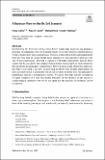A Bayesian View on the Dr. Evil Scenario
Author(s)
Azhar, Feraz; Guth, Alan H.; Namjoo, Mohammad H.
Download10670_2022_Article_536.pdf (245.9Kb)
Publisher with Creative Commons License
Publisher with Creative Commons License
Creative Commons Attribution
Additional downloads
Publisher with Creative Commons License
Publisher with Creative Commons License
Creative Commons Attribution
Terms of use
Metadata
Show full item recordAbstract
Abstract
In Defeating Dr. Evil with Self-Locating Belief, Adam Elga proposes and defends a principle of indifference for self-locating beliefs: if an individual is confident that his world contains more than one individual who is in a state subjectively indistinguishable from his own, then he should assign equal credences to the hypotheses that he is any one of these individuals. Through a sequence of thought experiments, Elga in effect claims that he can derive the credence function that should apply in such situations, thus justifying his principle of indifference. Here we argue, using a Bayesian approach, that Elga’s reasoning is circular: in analyzing the third of his thought experiments, he uses an assertion that is justifiable only if one assumes, from the start, the principle of indifference that he is attempting to justify. We agree with Elga that the assumption of equal credences is a very reasonable principle, in the absence of any reason to assign unequal credences, but we do not agree that the equality of credences can be so derived.
Date issued
2022-06-21Department
Massachusetts Institute of Technology. Department of Physics; Massachusetts Institute of Technology. Laboratory for Nuclear Science; Massachusetts Institute of Technology. Center for Theoretical PhysicsPublisher
Springer Netherlands
Citation
Azhar, Feraz, Guth, Alan H. and Namjoo, Mohammad H. 2022. "A Bayesian View on the Dr. Evil Scenario."
Version: Final published version